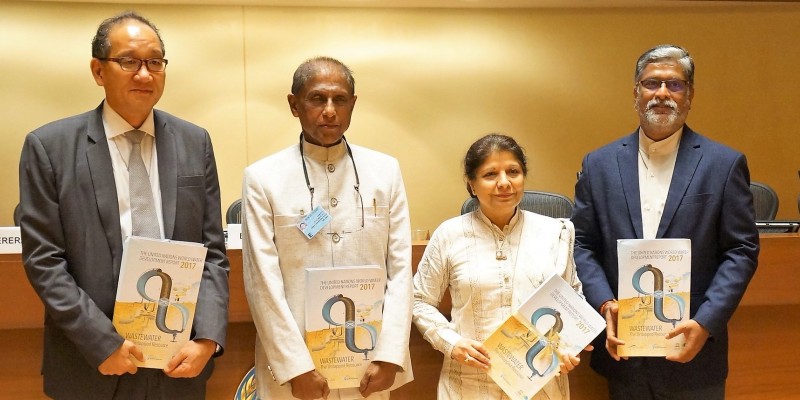UNESCO harnesses media to empower Myanmar’s rural communities with information
An innovative UNESCO initiative aimed at using communication to empower millions of people in Myanmar’s agricultural sector with accurate and timely development information was spotlighted at a recent event in Yangon.
UNESCO Yangon presented the project, “Educational TV and Radio Programs and Communication for Development Tools on Agriculture and Rural Livelihoods” at the event. Representatives from government, media, international organizations and civil society attended the event, reflecting the diversity of the team collaborating on the project.
Radio and TV programs addressing issues pertinent to agricultural workers’ lives and livelihoods are a key focus of the project, and UNESCO Project Officer Mikel Aguirre, says their utility need not be limited to initial broadcasts.
“The lifespan of the programmes will go beyond the radio and TV broadcasts,” Mr Aguirre said at the opening of the event. “UNESCO will distribute DVDs with the programmes to extension workers, information officers and local NGOs so that they can facilitate group viewings with the help of a set of guidelines that we have put together in a toolkit.”
Mr Aguirre noted that all materials produced under the project are provided with an open-source copyright, ensuring that ministry officials and all stakeholders can use them without limitation.
Dr Thida Tin, Deputy Director-General at the Ministry of Information, said that the timely information provided by these programs stands to directly benefit and empower millions of farmers and people working in fishing, especially those in more remote areas and women.
“[I hope that] Myanmar people can learn more both about their lives and farming through these programs and that marginalized groups in the rural agricultural sector can make the informed choices they need to make to improve their quality of life and reduce poverty,” she said, adding that she hoped, “this project can be extended for many years”.
In her opening remarks at the event, Libera Antelmi, Livelihood and Food Security Specialist at LIFT, heralded the project’s innovative approach.
“[The initiative] is one of the few LIFT projects that creates media and that focuses on the two-way communication of information with people in rural Myanmar as a pathway for building resilience and supporting Myanmar’s rural transformation,” she said. “Furthermore, it works across ministries and sectors to find impactful and lasting solutions to the problems facing Myanmar’s farmers and rural communities in general.”
Placing the project’s activities into a wider context, Mrs Antelmi highlighted the importance of knowledge as an enabler for increased food security. “The information provided by UNESCO is all the more important given the rapid changes taking place in Myanmar, such as climate change, high levels of migration and the increasing diversification of rural livelihoods into the off-farm rural economy.”
Mrs Antelmi said the project had the potential to enable “the impact of other rural development initiatives to be upscaled and rolled out, reaching more people and having greater impact.”
The event also featured presentations by UNESCO’s implementation partners, who showcased project’s advances and outputs at this mid-project stage. The project will be finalized in November 2017.
Cheri Mangrai from Australian Broadcasting Corporation International Development (ABCID) introduced the educational TV and radio programs produced under the initiative and screened a short film from it.
She announced that the nationwide broadcasting of the programs has already begun. (Click here for a Myanmar-language broadcast schedule).
The UNESCO-led initiative goes beyond TV and radio content to also encompass training on communications for development (C4D).
To that end, Dr Thant Thaw Kaung, CEO of the Myanmar Book Aid and Preservation Foundation, announced the launch of C4D training courses for 1000 participants.
He said content was developed based on one-on-one and focus group interviews in the states targeted by the project: Chin, Rakhine, Mandalay, Shan and Ayeyarwaddy. The courses aim to facilitate access, including digitally, to agricultural and livelihoods information, as well as to train information and extension workers in two-way, participatory and bottom-up communication strategies.
Htet Khaung Linn, Senior Reporter at Myanmar NOW, presented the achievements of the project’s news and feature services on rural and agricultural development, content that is co-produced by Myanmar Now and the Thomson Reuters Foundation.
Mr Khaung said the services delve into the type of agricultural and rural development issues that are often ignored by both mainstream and alternative news media in Myanmar. Moreover, they highlight “hidden” stories, filling a gap in current reportage and redefining news, especially as it pertains to the agricultural sector and rural life, from being events-oriented to issue-oriented.
A lively question and answer session as well as informal exchanges at a later reception offered participants further opportunities to share their experiences and plan to advance the project’s positive momentum.
This initiative is organized under the framework of the wider LIFT-funded Communication for Sustained Livelihoods and Food Security Project. For more information, please contact Mr Mikel Aguirre, Project Officer at UNESCO Myanmar (m.aguirre-idiaquez@unesco.org), or Mr Philipp Klotz, Project Analyst at UNESCO Myanmar (p.klotz@unesco.org).
Photo: Tanakorn Pussawong/Shutterstock.com








